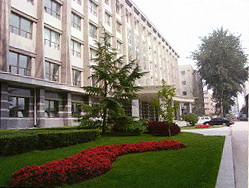 The Institute of Geology and Geophysics, Chinese Academy of Sciences (IGGCAS) was formed in June 1999, through the integration of the Institute of Geology, CAS and the Institute of Geophysics, CAS. In 2004, the Ionosphere Research Room of the Wuhan Institute of Physics and Mathematics, Chinese Academy of Sciences was also integrated into the IGGCAS. Since this integration, IGGCAS has become one of the most important and well known geoscience research institutions in China.
The Institute of Geology and Geophysics, Chinese Academy of Sciences (IGGCAS) was formed in June 1999, through the integration of the Institute of Geology, CAS and the Institute of Geophysics, CAS. In 2004, the Ionosphere Research Room of the Wuhan Institute of Physics and Mathematics, Chinese Academy of Sciences was also integrated into the IGGCAS. Since this integration, IGGCAS has become one of the most important and well known geoscience research institutions in China.
IGGCAS is strategically positioned to "establish a brand new international research center with the qualities of theoretical innovation, technical development, achievement transformation and sci-education integration", aiming at global technology front, national vital demands, national economic fields, and the main direction of solid Earth sciences. Original breakthroughs have been made in research on global Earth sciences to develop the theory of Earth sciences. IGGCAS's focuses are major scientific issues in the fields of national resources, energy and environment, so as to support national strategic needs and serve economic and social development. In recent years, IGGCAS has been committed to the transformation of research concepts, organization structure, management model and innovation systems. From a global perspective, IGGCAS has conducted scientific research on Tethys tectonic domain evolution and energy resource effect, craton destruction and massive metal mineralization, the Earth's interior structure and process, comparative planetology, and other disciplinary frontier matters, and has achieved important progress. At the same time, IGGCAS focuses on the strategic needs of national resource exploration to conduct integrated research on advanced deep resource exploration technology and independent equipment development with key breakthroughs. At present, IGGCAS has actively implemented the "Pioneering Act" plan of the Chinese Academy of Sciences to construct the "Earth Science Research Institute, Chinese Academy of Sciences", in part with Guangzhou Institute of Geochemistry, CAS and the Institute of Geochemistry, CAS. IGGCAS strives to be a leader in deep resource exploration equipment and development of frontier technology, a demonstrator and practitioner of new resource theory and innovation technology industrialization, the world’s leading provider of deep resources technology solutions, and a cultivator of high-end geo-science talent.
IGGCAS has a total of 734 staff members, including 363 senior professionals, 17 academicians of the Chinese Academy of Sciences, 1 academician of the Chinese Academy of Engineering, 43 professionals supported by the "National Science Fund for Distinguished Young Scholars", 31 professionals supported by the "Excellent Young Scientists Fund" and 7 research groups supported by the "NSFC Science Fund for Creative Research Groups". In 2009, IGGCAS was selected by the Organization Department of the Central Committee of the CPC as an "Innovative and Venture Base for Overseas Top Talents". In 2014, IGGCAS was selected as an "Innovative Talent Training Demonstration Base" by the Ministry of Science and Technology of China (MOST). IGGCAS has a post-graduate education system for Master's and PhD students, as well as a postdoctoral research system, which was one of the earliest to be authorized in China, and which is also included in the first batch of key bases of the CAS to train students toward Doctor's degrees. IGGCAS currently has 681 graduate students (including 25 abroad students) and 134 postdoctoral researchers.
IGGCAS houses the State Key Laboratory of Lithosphere Evolution and other five key labs as deep reservoir exploration pioneer technology and equipment development centers of CAS, namely the Laboratory of Earth and Planetary Physics, Laboratory of Shale Gas and Geological Engineering, Laboratory of Mineral Resources, Laboratory of Oil and Gas Resources, and Laboratory of Cenozoic Geology and Environment. IGGCAS's technology platform has 165 technical support and R&D staff, and it has built seven major technical platform series, i.e. Earth material composition and property analysis, geochronology dating, Earth interior structure detection, field observation station of space environment, paleo-environment data analysis, data processing and numerical simulation, and deep resource exploration equipment research and development, endowed with all-round comprehensive research capacity, from space geomagnetic environment observation to the deep Earth detection and numerical simulation. IGGCAS led the construction of the "Beijing Earth System and Environmental Science Major Instrument Region Center of the Chinese Academy of Sciences", providing strong technical support for IGGCAS and even international Earth system science research.
In recent years, IGGCAS has undertaken more than 200 national projects, including those for the National Major Science and Technology Project, National Major Scientific Equipment Development Project, National Key Research and Development Plan, Major Research Program, Major Subject and Major Project of National Natural Science Foundation, Strategic Pilot Project of CAS, and Major Deployment Program of CAS. IGGCAS has achieved a great number of innovative results in the field of solid geo-science by pursuing the academic cultural concept of meritocracy and loose fair, promoting the growth of talent, fostering innovative ideas, and enhancing the ability to perform scientific research and meet major national needs. Since 2000, IGGCAS has received 9 Second Prizes of the National Natural Science Award and 1 Second Prize of the National Science and Technology Progress Award, the most of any organization. In 2003, Academician Liu Dongsheng received the State Supreme Science and Technology Award. In addition, IGGCAS has focused greatly on intellectual property rights, having been authorized with 196 invention patents, 30 utility model patents, and 142 software registration copyrights.